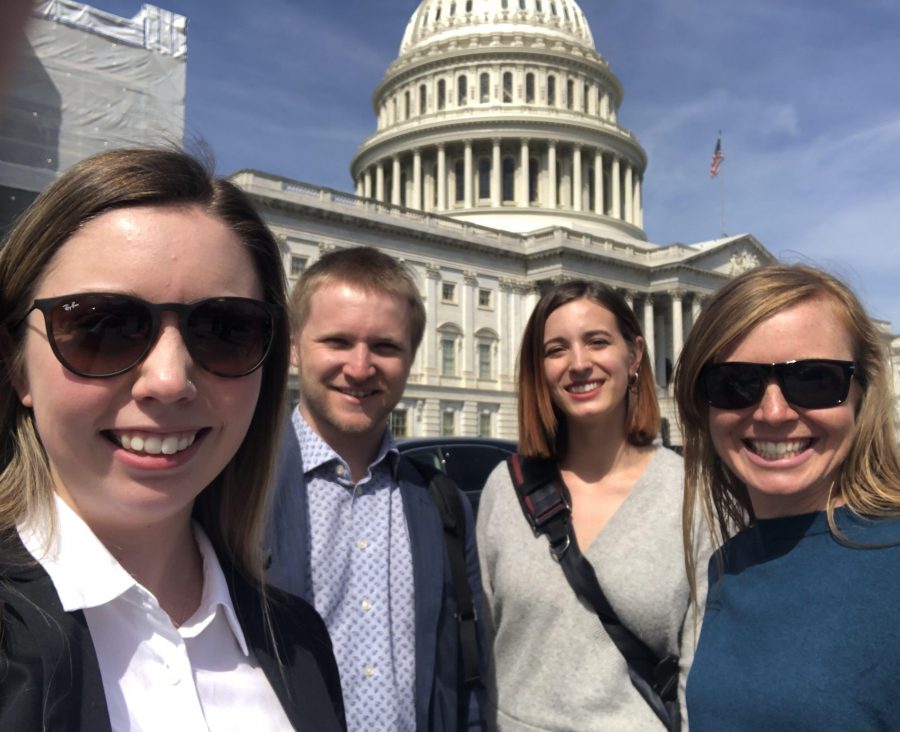Four University of Utah students attended a four-day CASE workshop in Washington D.C. put on by the American Association for the Advancement of Science. The workshop was designed for graduate students interested in working in science policy. Rebecca Hardenbrook, a graduate student in math and applied mathematics and a first-year Ph.D. student; Kendall FitzGerald, a geology master’s student; Jewell Lund, working on her Ph.D. in geography and Kaden Plewe, a student in the engineering department, applied what they learned at the workshop and established a student affiliated group with the Science Policy Network.
The four students want to further communicate what they learned in the CASE workshop to form a student group recognized by the Department of Student Leadership and Involvement called the Coalition for Utah Science and Policy.
The students were sponsored by the U’s Global Change and Sustainability Center to attend the workshop. Over the first three days of the CASE workshop, the students learned about policy and budgets. On the fourth day, they visited Utah’s Rep. Chris Stewart, Sen. Mitt Romney and Sen. Mike Lee. “We emphasized that we thought it was very important that they continue to fund science and various science agencies such as NSF or NASA,” Hardenbrook said.
“One of the initial discussions that we had was the difference between policy for science versus science for policy.” Lund stated, “There are policies that the government constructs that are related to the field of science and direct how funding can support that science and what science is appropriate to be funded. Then there’s scientific research that is both informed by policy needs and the research will then inform policymaking and those are two drastically different fields.”
They were surprised to find out that, according to the federal budget, many people in Congress consider science an interest group, “because most of us [scientists] are in the field we are in because we want to do things to improve society. We’re putting energy into work that we consider intrinsic to approaching challenges in society,” Lund remarked.
Hardenbrook said CUSP aims to bring together undergraduate and graduate students from around campus, including “both scientists and people who are just generally interested in policy and how science intersects with that [policy].” She added, “Our main three objectives are to educate, communicate and activate.”
At the beginning of the 2019-20 academic year, the four students expect to select a few projects or policy areas that members of CUSP can then work on throughout the year. In addition to discussing potential visits to Utah’s Capitol Hill, they hope to invite guest speakers to discuss budgets and government funding because there is a lack of understanding about where funding is going. They also plan on hosting other guest speakers with a background in science policy.
“There is a real interest in learning about career paths outside of academia,” FitzGerald said. Through CUSP, they hope to show other students at the U that there are career paths and opportunities outside of academia, no matter your interests. “You shouldn’t be afraid to reach out to your representatives if there is a topic or issue that you’re invested in,” emphasized FitzGerald. “It does seem kind of intimidating at first, but then you quickly realize that that’s their job. Every staffer that we met with was very open to talking to us about our concerns or what we wanted to advocate for in terms of science policy.”
An earlier version of this article said that students wanted to form the Coalition for Utah Science and Policy as an ASUU-recognized student group. As of May 2018, recognized student groups fall under the Department of Student Leadership and Involvement. We regret the error.



Ryan Rhodes • Apr 18, 2019 at 8:14 pm
A small correction and point of information: ASUU is no longer the entity that is responsible for the oversight, recognition, and support of Recognized Student Organizations (RSOs) at the U. As of May 2018, oversight of RSOs were moved to the Department of Student Leadership & Involvement. Within this department, a team known as the Organization Resource Group (ORG) oversees student organizations. ASUU remains as a supplemental funding resource for RSOs. For more information about this change, feel free to check out the OrgSync News Post: https://orgsync.com/91329/news_posts/321220